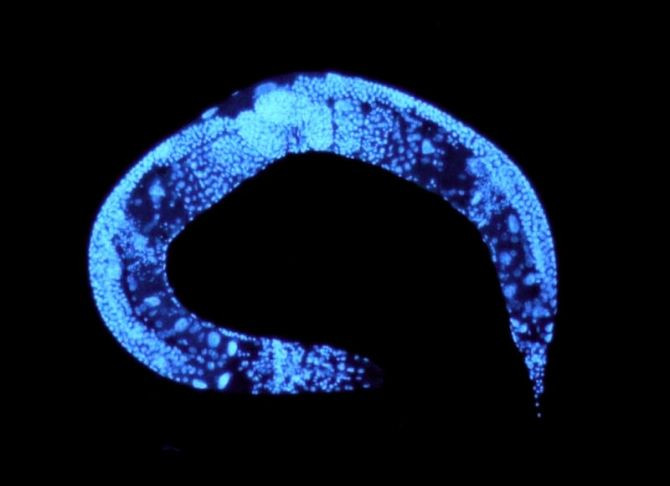Space Travel Genetically Alters Worms: Prolongs Life and Decelerates Muscle Aging

Spaceflight appeared to genetically alter worms in a way that prolonged their lifespan, according to new research.
Scientists studying the effects of extended flights in space on human bone and muscle mass had carried aboard their mission to the International Space Station (ISS) a number of Caenorhabditis elegans worms and brought them back for study.
After the worms were brought back from space, researchers found reduced activity in a group of genes that when artificially lowered in laboratory worms back on Earth lengthened the lives of the nematodes, according to a new study published in Scientific Reports.
"We identified seven genes, which were down-regulated in space and whose inactivation extended lifespan under laboratory conditions," researcher Dr. Nathaniel Szewczyk, from The University of Nottingham, said in a statement.
Despite its microscopic size, the C. elegans is one of the world's most-studied animals, partly because they were the first multi-cellular animal to have had its genetic structure completely sequenced and many of its 20,000 genes were found to perform the same functions as those in people.
C. elegans are often taken as cargo on space missions for research aiming to understand the effect of microgravity on the human body. The worms even survived the Space Shuttle Columbia disaster in 2003, and were able to recover weeks after the disaster.
Researchers from the ICE-FIRST project which involved scientists from Japan, France, the US and Canada compared the worms that had been taken or an 11-day trip on the space mission and flash-frozen once they returned to Earth to a control group of worms that was kept on Earth and flash frozen at the same time.
They found that, spaceflight seemed to suppress the accumulation of polyglutamine aggregates, or tangles of toxic proteins that normally accumulate within aging muscle, in worms.
Additionally, scientists found that deactivating each of the seven genes, which had been "down-regulated" in the spacefaring worms, in a set of laboratory worms appeared to prolong the life of worms that have never gone to space.
Researchers wrote that the group of genes that were more "switched off" were involved in signaling in the nervous and metabolic systems, and one of the genes appeared to be chemically similar to insulin, which when manipulated has been found to significantly lengthen C. elegans' lifetime in previous research.
"We are not entirely certain, but it would appear that these genes are involved in how the worm senses the environment and signals changes in metabolism in order to adapt to the environment. For example, one of the genes we have identified encodes insulin which, because of diabetes, is well known to be associated with metabolic control. In worms, flies, and mice insulin is also associated with modulation of lifespan," Szewczyk said in a statement.
"Most of us know that muscle tends to shrink in space. These latest results suggest that this is almost certainly an adaptive response rather than a pathological one," he concluded. "Counter-intuitively, muscle in space may age better than on Earth. It may also be that spaceflight slows the process of aging."
Published by Medicaldaily.com



























